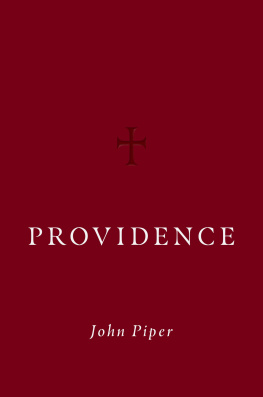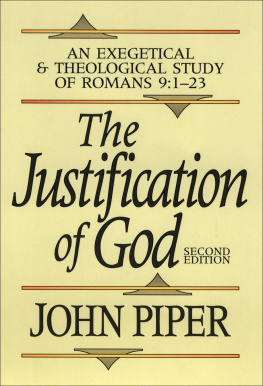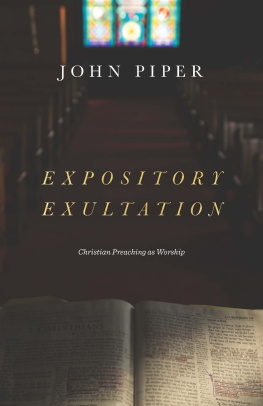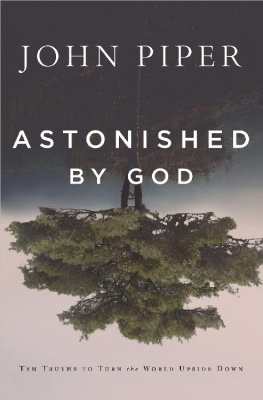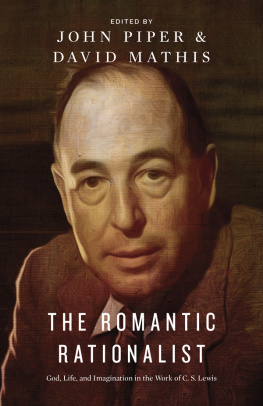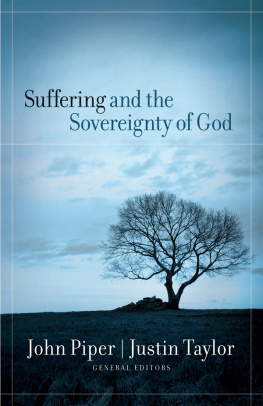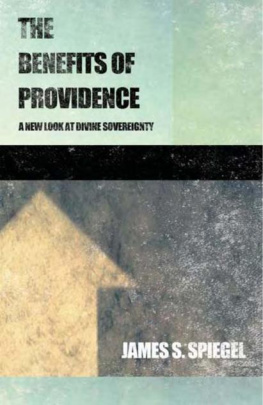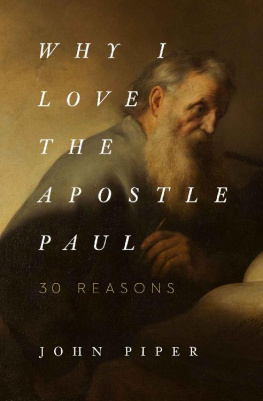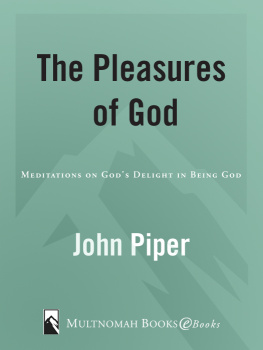Table of Contents
Landmarks
Part 1
A Definition and a Difficulty
We saw at the beginning of chapter 27 that God sometimes judges his people by seeing to it that certain kinds of sinful actions come to pass that provide particularly suitable judgment. For example, Davids adultery was punished by adultery against him (2 Sam. 12:1112). Throughout Scripture, God regularly expresses how fitting it is that punishments correspond to crimes not only in severity but also in kind. For example:
If there is harm, then you shall pay life for life, eye for eye, tooth for tooth, hand for hand, foot for foot, burn for burn, wound for wound, stripe for stripe. (Ex. 21:2325 )
With the judgment you pronounce you will be judged, and with the measure you use it will be measured to you. (Matt. 7:2)
The day of the L ord is near upon all the nations.
As you have done, it shall be done to you;
your deeds shall return on your own head. (Obad. 15)
He loved to curse; let curses come upon him!
He did not delight in blessing; may it be far from him! (Ps. 109:17)
Because you did not hate bloodshed, therefore blood shall pursue you. (Ezek. 35:6)
As your sword has made women childless, so shall your mother be childless among women. (1 Sam. 15:33)
How Would God Judge the Lowest Degradation?
This is how God often carries out his justice among men. And it was the sacrifice of children that seemed to be the low point of wickedness:
They sacrificed their sons
and their daughters to the demons;
they poured out innocent blood,
the blood of their sons and daughters,
whom they sacrificed to the idols of Canaan,
and the land was polluted with blood. (Ps. 106:3738 )
This level of wickedness God especially abhorred:
Then the anger of the L ord was kindled against his people,
and he abhorred his heritage. (Ps. 106:40)
How would God punish the sacrifice of ones own children? He warned in the covenant threats of Leviticus 26 and Deuteronomy 28 that he would spend his fury on them in a horrific form of poetic justiceby making them eat their own children:
If... you will not listen to me, but walk contrary to me, then I will walk contrary to you in fury, and I myself will discipline you sevenfold for your sins. You shall eat the flesh of your sons, and you shall eat the flesh of your daughters. (Lev. 26:2729 )
All these curses shall come upon you... because you did not obey the voice of the L ord your God.... You shall eat the fruit of your womb, the flesh of your sons and daughters, whom the L ord your God has given you, in the siege and in the distress with which your enemies shall distress you. (Deut. 28:45, 53)
Then came the urgent warning from Ezekiel and from Jeremiah, who could see these threats about to come true in their own time:
Because of all your abominations I will do with you what I have never yet done, and the like of which I will never do again. Therefore fathers shall eat their sons in your midst, and sons shall eat their fathers. And I will execute judgments on you, and any of you who survive I will scatter to all the winds. (Ezek. 5:910 )
Hear the word of the L ord , O kings of Judah and inhabitants of Jerusalem.... Behold, I am bringing such disaster upon this place that the ears of everyone who hears of it will tingle. Because the people have forsaken me and... have filled this place with the blood of innocents, and have built the high places of Baal to burn their sons in the fire as burnt offerings to Baal,... therefore, behold,... I will make them eat the flesh of their sons and their daughters... in the siege and in the distress. (Jer. 19:36, 9)
Then It Actually Happened
Then the unthinkable actually happened. The judgment fell, and the killers of children became the eaters of children, as the siege brought them to starvation:
Look, O L ord , and see!
With whom have you dealt thus?
Should women eat the fruit of their womb,
the children of their tender care? (Lam. 2:20)
The hands of compassionate women
have boiled their own children;
they became their food
during the destruction of the daughter of my people.
The L ord gave full vent to his wrath;
he poured out his hot anger. (Lam. 4:1011 )
The hatred of God for the murder of children, especially as a supposed act of worship, is matched by the shock of the words I will make them eat the flesh of their sons and their daughters (Jer. 19:9).
The Children! The Children!
If this were only a matter of wicked parents being made to endure the maddening moral stench of their own rotting consciences, we might put our hands over our mouths and stand silent with sickened, trembling approval at the Lords providence.
But even though the suffering of helpless children is not new, the horrors of parental wickedness have reached a new low in the sufferings of Jerusalem.
Widening the Lens of Our Focus: The Origin of Death
Part of the biblical answer to the question about how to understand the suffering and death of children is found in the way Pauls letter to the Romans connects the spiritual outrage of Adams first sin to the physical effects of human death and suffering. Paul connects Adams sin to the history of human death. Just as sin came into the world through one man, and death through sin, and so death spread to all men because all sinned... (Rom. 5:12). Paul explains that in Adam, God saw the entire human race represented in such a way that all his descendants were counted sinners: By the one mans disobedience the many were appointed sinners [ ] (5:19, my translation). Paul saw this appointing as sinners not as a consequence of fate or physical inheritance, but as a legal condemnation by God: One trespass led to condemnation for all men (5:18).
The outcome of suffering and death was not a natural consequence; it was a divine judgment: Judgment following one trespass brought condemnation (5:16). And the effect of that legal condemnation, and that decree of judgment, was the reign of death over all human beings: Because of one mans trespass, death reigned through that one man (5:17). Many died through one mans trespass (5:15). Sin reigned in death (5:21).
Subjected in Hope
This is the background for Pauls devastating and gloriously hopeful words in Romans 8:2022:
The creation was subjected to futility, not willingly, but because of him who subjected it, in hope that the creation itself will be set free from its bondage to corruption and obtain the freedom of the glory of the children of God. For we know that the whole creation has been groaning together in the pains of childbirth until now.
This [subjection] to futility is what we saw in Romans 5:1221. When sin entered the world, death entered the world as a condemnation and judgment. Death does not exist as an isolated judgment. The prelude to death for everyone is a life with much suffering, described in part in Genesis 3:1419. Paul broadens the picture now in Romans 8 to include the whole creation in Gods judgment because of sin.
The entire creation is subjected to futility (Rom. 8:20). Nothing escapes the brokenness of the world. The original goodness has been corrupted from the day when God pronounced his creation very good (Gen. 1:31). Things are painfully frustrating, again and again. Just when you think you have one thing fixed, another breaks. When one relationship is healed, another breaks down. When one disease is under control, another strikes. When one accident is avoided, another comes from a different direction.
Paul describes this fallen condition of creation as bondage to corruption (Rom. 8:21). It is slavery. The creation was subjected not willingly (8:20). Rather, the one who subjected it was God. We know this because Paul says he subjected it in hope that the creation itself will be set free (8:21). That was not Satans design, nor Adams. It was Gods. This is why I called Romans 8:2022 devastating and gloriously hopeful words. The condemnation to futility and corruption and suffering and death is devastating. But the promise that the subjection is a path to liberation is gloriously hopeful.

